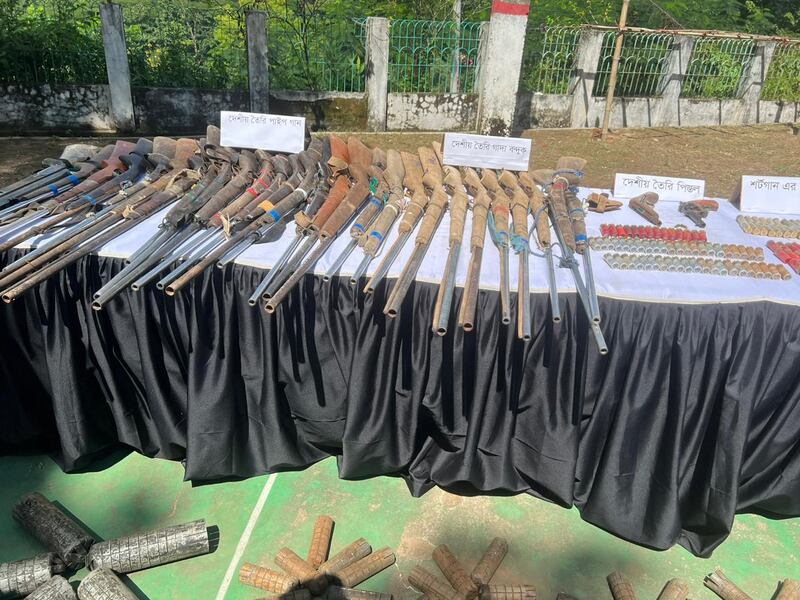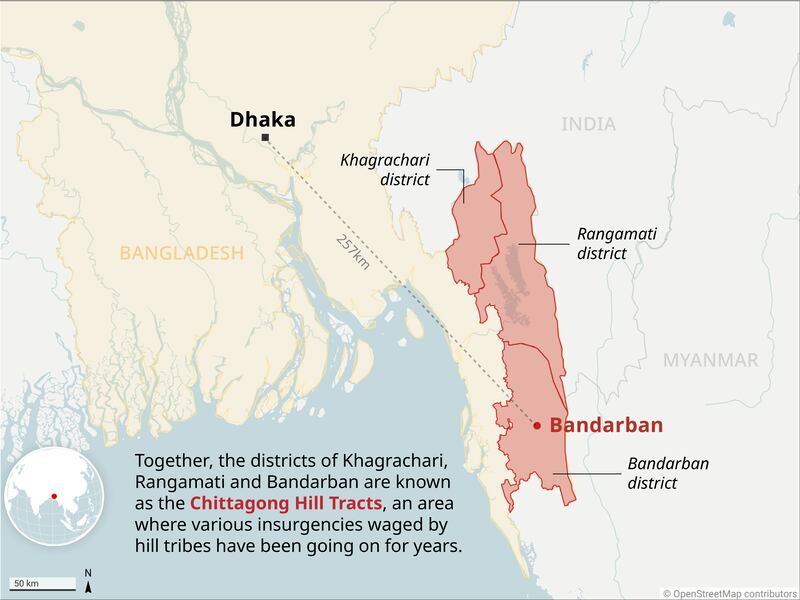Bangladeshi security forces have launched a crackdown on a nascent armed tribal group that, officials allege, helped train a budding Muslim extremist group in the Chittagong Hill Tracts, a restive southeastern region near the borders with Myanmar and India.
The joint campaign by the Rapid Action Battalion (RAB), an elite police unit, and the army has led to the arrests so far of at least 10 suspected members of the groups, since the operation began on Oct. 10 in one of the remotest areas in Bandarban, a district in the Hill Tracts region, authorities said.
The Kuki-Chin National Front (KNF), an armed hill tribe group, made headlines recently as they demanded an autonomous region for the indigenous Kuki people, many of whom now follow Christianity, in the Chittagong Hill Tracts (CHT). The group’s members posed with weapons for social media posts and YouTube videos.
Officials say they have uncovered a strong link between the national front and what they assert is a newly formed Muslim extremist group, Jama’atul Ansar Fil Hindal Sharqiya (JAFHS).
“We have concrete information that the newly formed militant group was being trained by KNF in remote areas of Bandarban district,” Home Minister Asaduzzaman Khan told BenarNews.
“Although the areas are very remote, our forces are optimistic about uprooting both groups from the hilly district.”

However, the launch of the anti-militant operation has mystified some human rights activists and experts. One observer expressed skepticism about the alleged link between an armed hill tribe group and Muslim extremists,
“Both the emergence of KNF and its intimacy with a hardline Islamist group are surprising to us,” Nirupa Dewan, a prominent rights activist and a former member of the National Human Rights Commission, told BenarNews.
Rivalries between ethnic armed groups have long beset the Hill Tracts, but none of them was known to have collaborated with any Islamic militant group. The region’s ethnic population, by and large, opposes what they view as encroachment by the Bengali resident population and settlers, who mainly follow Islam.
Known as a moderate Muslim-majority country, Bangladesh witnessed several bouts of violent Islamic extremism, most notably in July 2016, when a group of five extremists with ties to the Islamic State group killed 20 hostages, mostly foreigners, during an overnight siege at a café in Dhaka.
After a successful, if violent, crackdown by the security forces and a downturn in international Muslim extremism, violent militancy in Bangladesh had declined sharply in recent years, officials said, until JAFHS emerged on the scene. But beyond official statements, there’s scarce information available about the alleged new extremist group.
‘Hijrah’
On Wednesday, RAB chief M. Khurshid Hossain told reporters that the agency had launched an investigation following media reports in August that 55 young men had gone missing across the country, mostly from southeastern Cumilla district.
"Our investigation found that the young men embarked on so-called Hijrah. As they could not carry out militant activities in the mainland, they sought a safe haven in the remote hilly areas," he said.
In Islamic history, “Hijrah” refers to the flight by Prophet Muhammad and his companions to escape persecution in Mecca in 622 A.D. But members of modern Islamic extremist groups are also known to refer to Hijrah as the journey from their country of origin to the territories in their control.
“We soon contacted the military headquarters and conducted joint operations after our drone surveillance located the KNF camps. We arrested some people and recovered 21 firearms,” the RAB chief said, adding that the operations had dismantled camps used for training exercises.
But back in September, The Daily Star newspaper reported that at least one of the missing young men was in RAB’s custody and had been arrested from Dhaka.
The police unit is notorious for arresting people without public announcements, leaving rights groups to cry foul about enforced disappearances. Last December, the U.S. government sanctioned several current and former leaders of RAB for widespread rights abuses.
On Oct. 6, RAB spokesman Khandaker Al Moin publicly revealed that JAFHS was an emerging Muslim extremist group and acknowledged that the battalion had arrested some of its suspected members who had been among the young men missing from Cumilla.
Moin told reporters that the information gleaned from the detained members established the connection between KNF and JAFHS, which spurred the joint operation in the CHT four days later.
He also said that the new extremist group was formed by members of three banned extremist organizations, Ansar Al-Islam, Jamaat-ul-Mujahideen Bangladesh, and Harkat-ul-Jihad-al-Islami – all of which were reportedly involved in violent attacks in the past.
In a separate development, the Dhaka police’s Counter-Terrorism and Transactional Crime (CTTC) unit arrested five alleged members of JAFHS on Wednesday.

KNF controversy
It is unclear when KNF was formed, but the group, also known as the Bawm Party, was accused of killing a man in a remote village in Bandarban in April.
On June 21, the group drew national attention after it claimed responsibility on social media for killing three people.
A prominent rights activist from Bandarban, who requested anonymity to talk freely because he feared for his safety, told BenarNews that KNF had been formed with the knowledge of the local security apparatus in the CHT.
KNF has yet to publicly address the allegations that it collaborated with an Islamic extremist group. But after the crackdown began, the group refuted the characterization that it was a “separatist” group.
On the contrary, the group said on Facebook, “Kuki-Chin communities have never been involved in any anti-government activities that could threaten the territorial integrity of Bangladesh.”
The group also regularly posts statements in support of the Bangladesh army and the majority Bengali population in the CHT — in stark contrast to more prominent ethnic groups that oppose them.
KNF’s arch-enemy appears to be the Parbatya Chattagram Jana Samhati Samiti (PCJSS), the oldest ethnic political group in the CHT that led an insurgency between the 70s and 90s. PCJSS’ armed members formally surrendered to the government in 1997 following a peace deal, but in the years since, several other ethnic groups were established and that are now locked in violent conflict against each other.
Abdur Rashid, a retired army general and security analyst, suspects political patronage behind the rise of groups such as KNF.
“Both KNF and the Islamist group emerged at a time when Bangladesh is preparing for the next general election, so there may be a political agenda,” he said.
